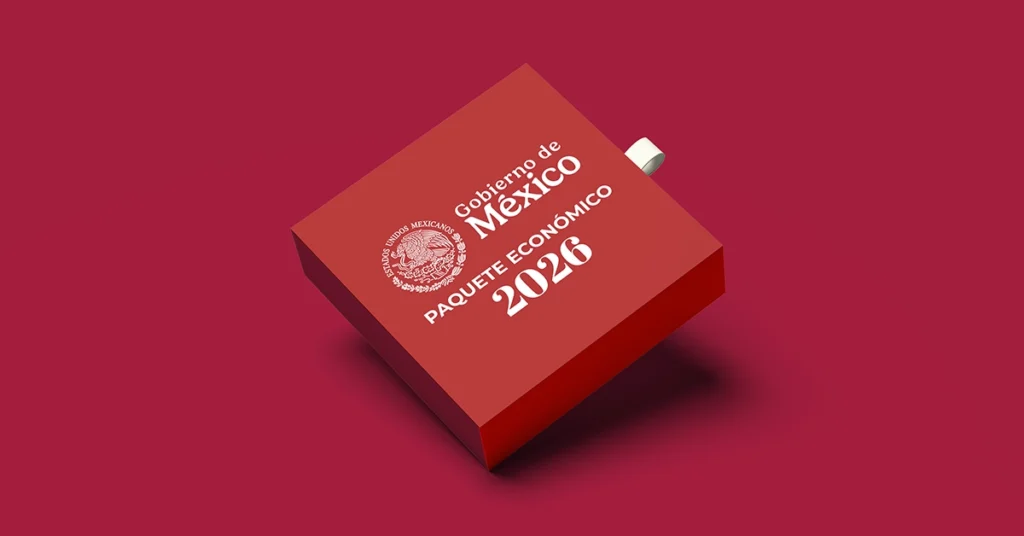MEXICO FISCAL POLICY | CROSS-BORDER TRANSACTIONS | GOVERNANCE OVERSIGHT
Executive point: Mexico’s 2026 fiscal reform is not only a tax update. For Canada–Mexico enterprises, it raises the bar for traceability, system readiness, and board-level governance across cross-border transactions.
1. A new fiscal cycle with international scope
Mexico’s 2026 Economic Package, approved by the Senate in October 2025, marks a decisive shift in the country’s fiscal policy toward non-residents, digital platforms, and cross-border transactions.
The reform combines greater transparency and oversight with targeted incentives aimed at attracting long-term, productive investment. For organizations operating between Mexico and Canada, this change requires a broader perspective—one that integrates tax planning, compliance governance, and cross-jurisdictional accountability.
2. Key changes affecting cross-border business
Non-resident digital platforms. Mexico will now require non-resident entities that sell goods or digital services to Mexican users to withhold and remit Value Added Tax (VAT), even without a permanent establishment in the country. Platforms must issue electronic VAT certificates, grant real-time access to their transaction systems to the Mexican Tax Administration (SAT), and provide detailed information on operations and users. Failure to comply may result in temporary suspension of operations.
For Canadian SaaS, e-commerce, or streaming companies with Mexican clients, this development demands an immediate review of fiscal compliance, data traceability, and cross-border reporting frameworks.
Capital repatriation. Corporations and individuals holding funds abroad as of September 8, 2025, may repatriate them by paying a 15 percent final income tax, provided that the resources are invested in productive activities in Mexico for at least three years. This incentive is designed to formalize offshore capital while stimulating domestic investment, yet it carries obligations of lawful-source verification, documentation, and ongoing audit control. Boards of directors and audit committees will need to implement internal policies to ensure traceability and compliance with these conditions.
Industrial relocation and regional development. Under the consolidated Plan México, federal and regional programs now align to promote industrial relocation, electromobility, and infrastructure development. Eligible companies may access accelerated deductions and tax incentives but will also face expanded documentation and transparency requirements. For Canadian manufacturers and suppliers relocating operations to Mexico under the USMCA framework, aligning tax strategy and governance oversight is essential to maintain regulatory consistency on both sides of the border.
FIFA World Cup 2026 incentives. Entities and individuals participating in the organization or hosting of the 2026 FIFA World Cup will be entitled to temporary tax benefits and streamlined compliance measures beginning in late 2025. Although short-term, this framework requires prior registration, verification of eligibility, and coordination to prevent double taxation.
3. Who is affected
| Category | Typical examples | Principal risks | New obligations |
|---|---|---|---|
| Non-resident digital platforms | SaaS, e-commerce, digital services | Suspension of operations, fiscal exposure | VAT withholding, real-time system access |
| Corporations or investors with offshore capital | Holdings, family offices, subsidiaries | AML/PLD risk, source-of-funds documentation | 15% ISR, three-year investment requirement |
| Manufacturing and nearshoring firms | Automotive, electromobility, logistics | Double taxation, regulatory overlap | Fiscal, environmental and regional compliance |
| FIFA-related enterprises | Tourism, construction, events, services | Eligibility verification, dual reporting | Special registration, compliance filing |
Governance note: The groups most exposed are those with cross-border revenue flows, sensitive data obligations, or capital movements that must be demonstrated—not merely declared.
4. Governance and compliance under the new framework
The 2026 reform transcends taxation—it reshapes corporate governance expectations for entities with cross-border exposure. Boards should reinforce audit, risk, and compliance oversight to ensure:
- Transparent control over repatriated funds and their allocation to productive investment.
- Secure information systems capable of responding to real-time data requests from authorities.
- Full disclosure of ownership and beneficial-ownership structures, consistent with Mexican and Canadian standards (SAT and FINTRAC).
- Alignment between the governance obligations of the USMCA, Mexico’s General Law of Commercial Companies (LGSM), and Canada’s Canada Business Corporations Act (CBCA).
5. The Symbiosis perspective
At Symbiosis, we view fiscal change as a governance issue rather than a mere tax adjustment. The convergence between Mexico’s regulatory evolution and Canada’s transparency frameworks calls for an integrated approach that unites tax discipline, ethical compliance, and board-level accountability.
Our Cross-Border Compliance Review (CBCR) and Corporate Governance Alignment programs are designed to help organizations:
- Identify cross-jurisdictional risks.
- Develop coherent binational compliance structures.
- Align governance and reporting standards across both markets.
6. Conclusion and next steps
Mexico’s 2026 fiscal reform redefines how companies must document, govern, and prove integrity across borders. For binational organizations, the challenge is no longer simply to comply, but to demonstrate coherence between both legal systems.
Symbiosis helps organizations build that bridge—integrating governance, compliance, and cross-border strategy under one consistent framework.
Closing note: In Canada–Mexico structures, fiscal compliance becomes credible only when governance is demonstrable—through evidence, controls, and board-ready accountability.
Note: This article is provided for general informational purposes and does not constitute legal, tax, or investment advice. For advice on your specific situation, consult qualified professionals in the relevant jurisdiction(s).






